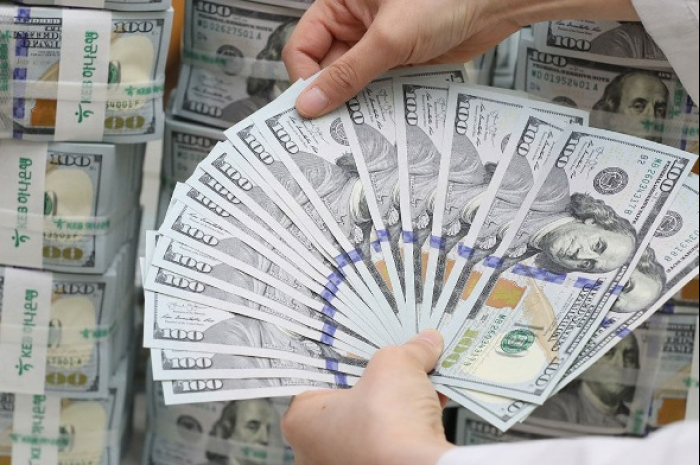Economy
FDI pledges to S.Korea set fresh record in H1 2023
First-half period commitments jump by 54% on-year; Korea emerges as alternative investment destination to China
By Jul 05, 2023 (Gmt+09:00)
3
Min read
Most Read
LG Chem to sell water filter business to Glenwood PE for $692 million


KT&G eyes overseas M&A after rejecting activist fund's offer


Mirae Asset to be named Korea Post’s core real estate fund operator


StockX in merger talks with Naver’s online reseller Kream


Meritz backs half of ex-manager’s $210 mn hedge fund



Foreign direct investment pledges to South Korea from January to June of this year soared 54.2% on-year, hitting a record high for the first-half period. Korea has emerged as an alternative investment destination to China amid the US-China trade disputes, experts say.
Korea saw a combined $17.1 billion in commitments via FDI in the first six months, the Ministry of Trade, Industry and Energy said on Tuesday. The investment commitments from overseas have increased for four consecutive quarters since the last July-September period.
The FDI that actually arrived in Asia’s fourth-largest economy from January to June reached $7.8 billion, up 6% from a year ago.
The manufacturing sector received $7.6 billion in FDI commitments during the first-half period, up 145.9% on-year. The electric and electronics field, which includes semiconductors and batteries, saw pledges skyrocket 663% on-year. Those to the chemical engineering field also soared 464.1% during the same period.
The service sector received $8.5 billion in commitments during the first six months, up 11% from a year ago.
The European Union and the UK were the biggest investors in the first half of this year. Their combined commitments surged 144.8% to $4.3 billion.
The US pledged $3.7 billion, up 24.1% on-year. FDI commitments from China, Hong Kong, Taiwan, Singapore and Malaysia increased 32.8% on-year to $3.3 billion.
LESS CAPITAL IN CHINA, HONG KONG
“The ongoing US-China trade conflicts are reshaping global industries amid rising supply chain uncertainties,” said a trade ministry official. “More foreigners are directly investing in Korea, the powerhouse of chips and batteries, and cutting down on capital injections in China and Hong Kong these days,” the official added.
China, which has a solid basis in the manufacturing industry, has seen FDI pledges sharply decline – global corporates’ direct investments in China nearly halved to $189.5 billion in 2022 from $344.1 billion in 2021, according to economic research firm CEIC Data.
FDI in Hong Kong also fell from $137.2 billion to $109.6 billion during the same period.
Some global companies are also considering tapping into Korea instead of Singapore, another official said. Danish wind power giant Vestas Wind Systems A/S decided last month to relocate its Asia-Pacific headquarters from Singapore to Korea with a $300 million investment.
Foreigners have increased their direct investments in Korea and Japan in recent years. FDI arrived in Korea jumped from $26.9 billion in 2018 to $29.5 billion in 2021 and $30.4 billion in 2022. Market watchers speculate the funds will surpass $35 billion this year.
Japan’s FDI stock, the value of foreign investors’ equity in and net loans to local companies, reached 46.8 trillion yen ($323.6 billion) as of the first quarter of this year. It has increased by 37% over the past three years, according to data from the Ministry of Finance.
The US Inflation Reduction Act (IRA) is also a boon to FDI in Korea. It offers tax credits to buyers of electric vehicles that meet certain requirements: the cars should be assembled in North America, or use batteries with critical minerals from the region or US’ free trade agreement (FTA) partners.
Korea and Singapore are the two Asian countries with such US trade agreements. Global investors have a preference for Korea given its robust manufacturing infrastructure, industry insiders said.
Write to Han-Shin Park and Sul-Gi Lee at phs@hankyung.com
Jihyun Kim edited this article.
More to Read
-
 EconomyS.Korea’s direct investment abroad hits record high in Q1 2023
EconomyS.Korea’s direct investment abroad hits record high in Q1 2023May 24, 2023 (Gmt+09:00)
2 Min read -
 Corporate investmentSouth Korea's 2021 outbound FDI at record-high $76 bn
Corporate investmentSouth Korea's 2021 outbound FDI at record-high $76 bnMar 24, 2022 (Gmt+09:00)
1 Min read -
 Korean stock marketSeoul launches investment promotion agency for FDI expansion
Korean stock marketSeoul launches investment promotion agency for FDI expansionFeb 07, 2022 (Gmt+09:00)
2 Min read
Comment 0
LOG IN


